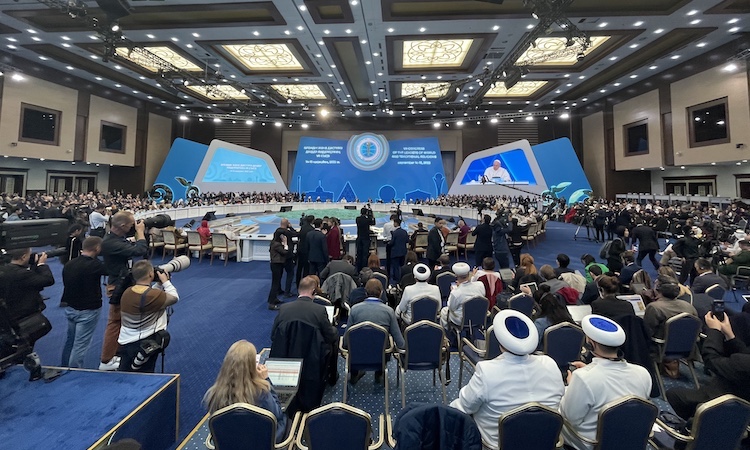By Kalinga Seneviratne
NUR-SULTAN, Kazakhstan (INPS Japan/IDN) — Pope Francis has raised the prospect of Kazakhstan becoming the centre of a new route connecting the East and West, but this time a route that builds on human relations and respect.
Kazakhstan was once the meeting place of traders and travellers travelling from the East to the West, known as the Silk Route. In the 21st century, the Chinese are trying to revive these routes via railways and highways to promote trade across the world known as the Belt and Road Initiative (BRI). JAPANESE
While inaugurating the Seventh Congress of Leaders of World and Traditional Religions in the Kazakh capital on September 14, the Pontiff gave a new definition to such a route to wean humanity away from purely material pursuits.
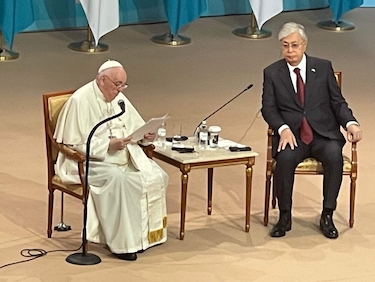
“We are meeting in a country traversed down the centuries by great caravans. In these lands, not least through the ancient silk route, many histories, ideas, faiths and hopes have intersected,” said Pope Francis addressing 1000 delegates—mainly spiritual leaders from 50 countries. “May Kazakhstan be once more a land of encounter between those who come from afar.”
He added that such a route should be “centred on human relationships: on respect, sincere dialogue, respect for the inviolable dignity of each human being and mutual cooperation”.
Pointing out that the previous international security system is collapsing, he averred, “the solution to these problems is goodwill, dialogue, and cooperation”.
President of Kazakhstan Kassym-Jomart Tokayev pointed out that in the 12th to 14th centuries, Nur-Sultan was home to Buddhist temples, Christian churches and Muslim mosques. “The Kazakh land has become a bridge between West and East,” he noted, adding, “unfortunately, distrust, tension, and conflicts have returned to international relations”.
The Pope made a passionate appeal for religious leaders to work towards eradicating “the injustice of global inequalities and imbalances…so forcefully brought out” by Covid-19.
“How many people, even today, lack ready access to vaccines?” he asked. “Let us be on their side, not on the side of those who have more and give less. Let us become prophetic and courageous voices of conscience.”
“Poverty is precisely what enables the spread of epidemics and other great evils that flourish,” argued the Pontiff. “As long as inequality and injustice continue to proliferate, there will be no end to viruses even worse than Covid—the viruses of hatred, violence and terrorism,” he warned.
In the plenary sessions, many of the speakers representing major religions and various regions echoed the same message.
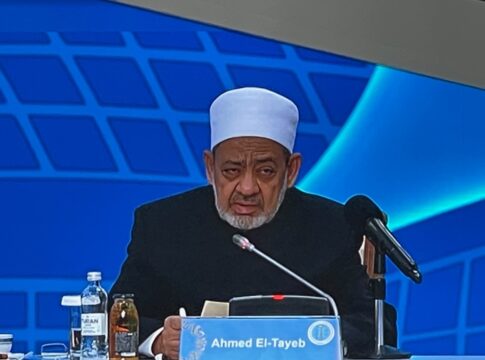
Professor Ahmed El Tayeb, Grand Imam of Cairo’s Al-Azhar Islamic university, lamented that as we were about to recover from the pandemic, we have been overwhelmed by other disasters. “We have recently been affected by arrogant policies affecting the global economy, destroying people’s lives,” he noted. “It is painful (that) religion with its moral teachings is not guiding modern civilization.”
Anthony Volokolamsk, chairman of external church relations of Moscow Patriarchy, quoting from a statement from the church’s leader, said, “we have seen misrepresentation of facts, we hear words filled with hate against nations and peoples (which) spur people against dialogue and cooperation”. He thanked the Forum provided by Congress for creating an opportunity to conduct such a dialogue.
“Civilization cannot be divided into good and bad,” argued Li Guangfu, Chairman of the Chinese Taoist Association. “We need to develop mutual respect.”
Saleh bin Abdul-Aziz Al ash-Sheikh, the official representative of the Custodian of the Two Holy Mosques, the King of Saudi Arabia, also argued for building bridges between religions. “It is important that religion is not used to create chaos in society,” he said. “We need to promote values of social responsibility.” Thus, he added, the role of religious leaders should be to motivate others to practice charity, justice, righteousness and compassion.
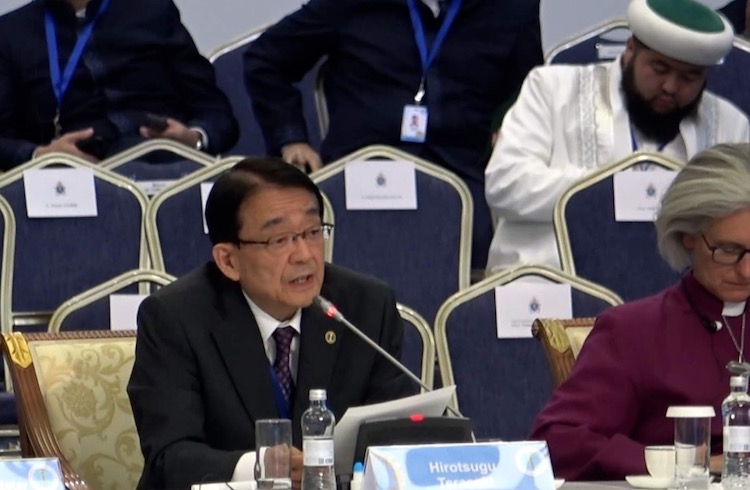
Hirotsugu Terasaki, Vice President of the Japanese Lay Buddhist organization Soka Gakkai (photo above), pointed out that it is now more important than ever before to reach out to those in distress. Referring to teachings in the Lotus Sutra he argued that “one should have a sense of relief and joy when a person is helped to overcome what has seemed at one time to be a harrowing and intractable plight”.
Expressing a sole voice from Africa, Dr Fidon Mwombeki, general secretary of the All-Africa Council of Churches, argued that there are people in all religions who don’t respect the dignity of others, which creates conflict when others react. When IDN asked him later to explain this point further, he said, “when people don’t meet, they have all these stereotypes, but when you meet, you discover that this is not what I thought”.
Dr Mwombeki explained that in Africa, so many people think Islam is violent because of what is happening in Somalia, Zaire and northern Nigeria. “When I meet Muslim people here and see how they talk about Islam, its commitment to the human dignity of all, (I see) their attitude to life is different,” he noted.
The Final Declaration
The final declaration of the Seventh Congress, presented at the end of the two-day meeting in the presence of Pope Francis, contained 35 points and recommendations. It affirmed that the purposes of the Congress and the Declaration is to guide contemporary and future generations of humankind in promoting a culture of mutual respect and peacefulness by making available a document that could be used in public administration of any country in the world, as well as by international organizations, including UN institutions.
Maulen Ashimbayev, Head of the Secretariat of the Congress of the Leaders of World and Traditional Religions, said after the declaration was read out that the document will be presented to the members of the United Nations at the forthcoming UN General Assembly sessions.
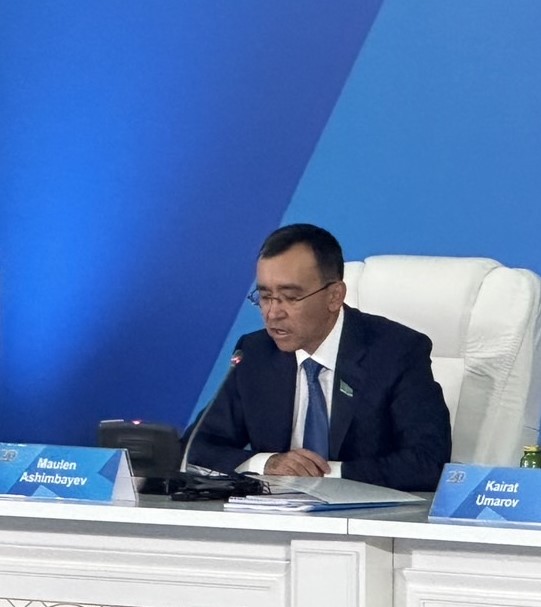
The Declaration also instructed the Secretariat of the Congress to develop a concept paper for the development of the Congress of the Leaders of World and Traditional Religions as a global interreligious dialogue platform for the decade of 2023-2033.
In wrapping up the proceedings of the Seventh Congress, Kazakh President Tokayev said that it is vital to put to good use the peace-making potential of religions and unite the efforts of spiritual leaders to pursue long-term stability.
“As we face an increasingly turbulent geopolitical post-pandemic world, it becomes more crucial to develop new approaches to strengthening inter-civilizational dialogue and trust at the global level. I believe that this forum made a significant contribution to this vital ongoing work,” Tokayev noted.
He also thanked Pope Francis for visiting the country and attending the Congress, which he thinks would help to give better exposure globally for the ideas and recommendations expressed in the final declaration.
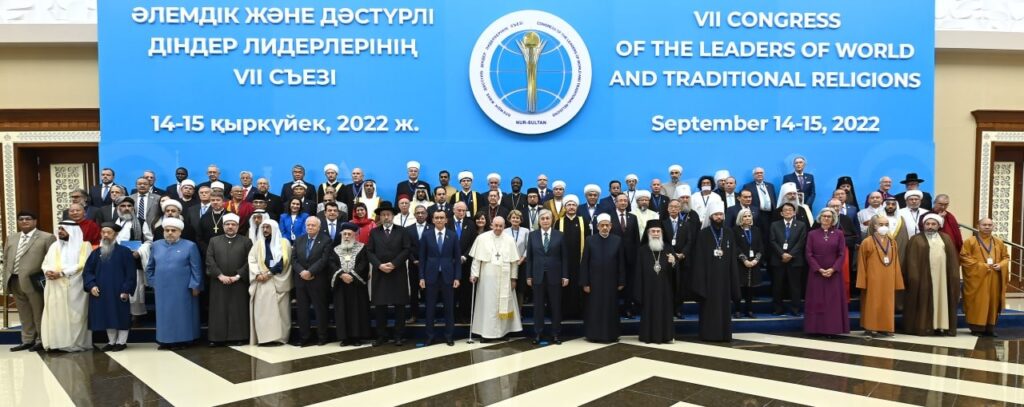
It was agreed at the final session that the Eighth Congress of Leaders of World and Traditional Religions will be held in Nur-Sultan in three years in September 2025. [INPS Japan/IDN – 17 September 2022]
Photo: Pope Francis delivering his inaugural keynote speech at the Seventh Congress of Leaders of World and Traditional Religions in the Kazakh capital on September 14. Credit: Katsuhiro Asagiri | INPS-IDN Multimedia Director


